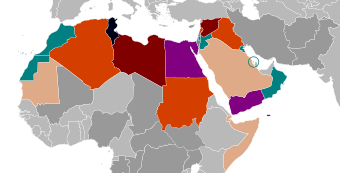
The Arab Spring saw mass unrest in the Arab world early in the decade:
Government overthrown multiple times
Government overthrown
Civil war
Protests and governmental changes
Major protests
Minor protests Other protests and militant action outside the Arab world
The 2010s began amid a global financial crisis and subsequent international recession dating from the late 2000s. The resulting European sovereign-debt crisis became more pronounced early in the decade and continued to affect the possibility of a global economic recovery. Austerity policies particularly affected Portugal, Ireland, Greece, and Spain. Such policies were among factors that led to the 15-M and Occupy movements. Other economic issues, such as inflation and an increase in commodity prices, led to unrest in many lower-income countries. Unrest in some countries – particularly in the Arab world – evolved into socioeconomic crises triggering revolutions in Kyrgyzstan, Tunisia, Egypt, Bahrain and Yemen, as well as civil wars in Libya and Syria, in a widespread phenomenon commonly referred to in the Western world as the Arab Spring, with repercussions from the revolutions continuing into the 2020s.
The United States continued to retain its global superpower status while an assertive China, along with launching vast economic initiatives and military reforms, sought to expand its influence in the South China Sea and in Africa, solidifying its position as a potential superpower; competition between China and the U.S. coalesced into a "containment" effort and a trade war. Elsewhere in Asia, the Koreas improved their relations and Osama bin Laden was assassinated by U.S. forces in a raid on his compound in Pakistan, bookmarking the continued War on Terror. The U.S. continued its military involvement in many parts of the world, including Afghanistan, Iraq, Libya, Syria, Pakistan, the Sahara, the Horn of Africa, the Philippines, the Caribbean and Central America. The rise of the Islamic State of Iraq and the Levant extremist organization in 2014 erased the borders between Syria and Iraq, resulting in a multinational intervention. In Africa, South Sudan broke away from Sudan and mass protests saw longtime strongmen deposed.
thumb The Internet of things saw substantial growth during the 2010s due to advancements in wireless networking devices, mobile telephony, and cloud computing. Advancements in data processing, growing utility of fiber-optic communication, and the rollout of 5G broadband allowed data and information to disperse among domains at paces never before seen. Online websites and resources, especially social networking, set a de facto standard in digital communication. Online nonprofit organization WikiLeaks gained international attention for publishing classified information on topics including Guantánamo Bay, Syria, the Afghan and Iraq wars, and United States diplomacy. The website's editor-in-chief, Julian Assange, was temporarily granted political asylum by Ecuador, while the United States accused Chelsea Manning of leaking classified information and conducted a court-martial. Elsewhere, Edward Snowden blew the whistle on global surveillance, raising awareness on the role governments and private entities have in mass surveillance and information privacy.
Shifting social attitudes saw LGBT rights and female representation make substantial progress during the decade, particularly in the West and parts of Asia and Africa. Combating pollution and climate change continued to be major global environmental concerns as protests, initiatives, and legislation garnered substantial media attention, along with sustainable living programs. Major natural disasters included the 2010 Haiti earthquake, the 2011 Tōhoku earthquake and tsunami, the Nepal earthquake of 2015, the 2018 Sulawesi earthquake and tsunami, and the devastating hurricanes Harvey, Irma, Maria, Haiyan (Yolanda) and Sandy. Other major international events and phenomena of this decade include the European migrant crisis, the Russian annexation of Crimea, the Me Too movement, and the rise of slacktivism.
Around 2016, much of the Western world began to experience a neo-nationalist political backlash against globalization, especially against immigration policy and free-trade agreements. This trend grew more evident after the Brexit vote in the United Kingdom, the election of Donald Trump as President of the United States, and the European Parliament elections of 2019. Populist sentiment rose in Asian countries in the late 2010s, particularly in Southeast Asia and India. Growing economic inequality in developed countries was also an important topic and concern throughout the decade. Sitting world leaders such as Hugo Chávez, Muammar Gaddafi and Kim Jong-il all died in office, as did former leaders Fidel Castro, Nelson Mandela, Margaret Thatcher, Helmut Kohl and George H. W. Bush.

|
This page uses content that though originally imported from the Wikipedia article 2010s might have been very heavily modified, perhaps even to the point of disagreeing completely with the original wikipedia article. The list of authors can be seen in the page history. The text of Wikipedia is available under the Creative Commons Licence. |